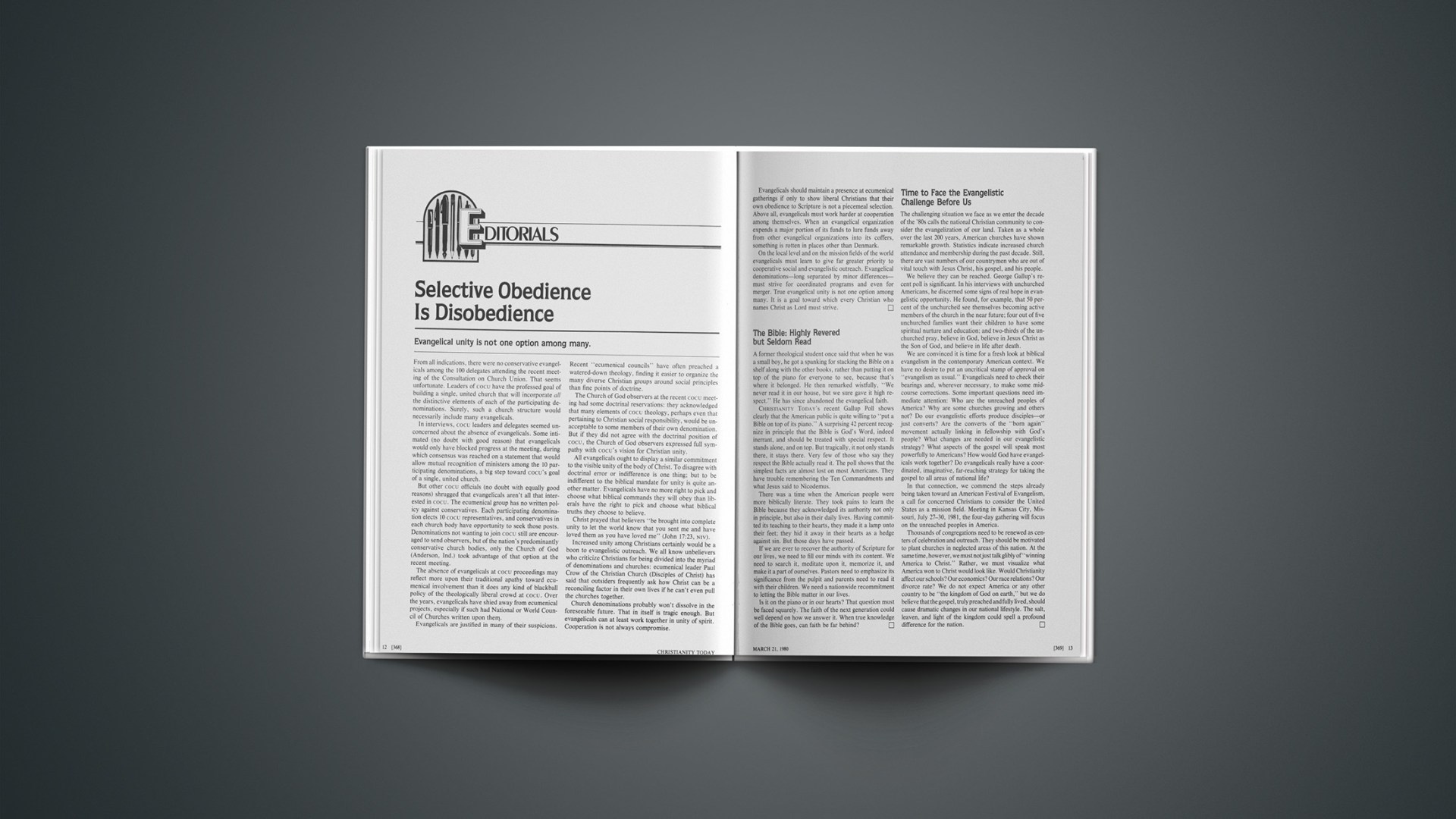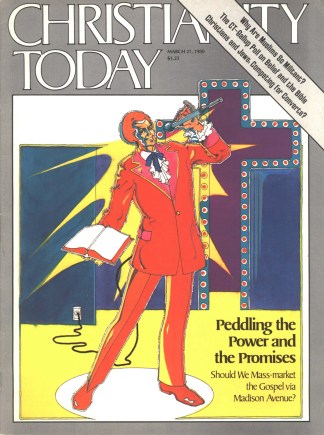Evangelical unity is not one option among many.
From all indications, there were no conservative evangelicals among the 100 delegates attending the recent meeting of the Consultation on Church Union. That seems unfortunate. Leaders of COCU have the professed goal of building a single, united church that will incorporate all the distinctive elements of each of the participating denominations. Surely, such a church structure would necessarily include many evangelicals.
In interviews, COCU leaders and delegates seemed unconcerned about the absence of evangelicals. Some intimated (no doubt with good reason) that evangelicals would only have blocked progress at the meeting, during which consensus was reached on a statement that would allow mutual recognition of ministers among the 10 participating denominations, a big step toward COCU’s goal of a single, united church.
But other COCU officials (no doubt with equally good reasons) shrugged that evangelicals aren’t all that interested in COCU. The ecumenical group has no written policy against conservatives. Each participating denomination elects 10 COCU representatives, and conservatives in each church body have opportunity to seek those posts. Denominations not wanting to join COCU still are encouraged to send observers, but of the nation’s predominantly conservative church bodies, only the Church of God (Anderson, Ind.) took advantage of that option at the recent meeting.
The absence of evangelicals at COCU proceedings may reflect more upon their traditional apathy toward ecumenical involvement than it does any kind of blackball policy of the theologically liberal crowd at COCU. Over the years, evangelicals have shied away from ecumenical projects, especially if such had National or World Council of Churches written upon them.
Evangelicals are justified in many of their suspicions.
Recent “ecumenical councils” have often preached a watered-down theology, finding it easier to organize the many diverse Christian groups around social principles than fine points of doctrine.
The Church of God observers at the recent cocu meeting had some doctrinal reservations: they acknowledged that many elements of cocu theology, perhaps even that pertaining to Christian social responsibility, would be unacceptable to some members of their own denomination. But if they did not agree with the doctrinal position of cocu, the Church of God observers expressed full sympathy with COCU’s vision for Christian unity.
All evangelicals ought to display a similar commitment to the visible unity of the body of Christ. To disagree with doctrinal error or indifference is one thing; but to be indifferent to the biblical mandate for unity is quite another matter. Evangelicals have no more right to pick and choose what biblical commands they will obey than liberals have the right to pick and choose what biblical truths they choose to believe.
Christ prayed that believers “be brought into complete unity to let the world know that you sent me and have loved them as you have loved me” (John 17:23, NIV).
Increased unity among Christians certainly would be a boon to evangelistic outreach. We all know unbelievers who criticize Christians for being divided into the myriad of denominations and churches: ecumenical leader Paul Crow of the Christian Church (Disciples of Christ) has said that outsiders frequently ask how Christ can be a reconciling factor in their own lives if he can’t even pull the churches together.
Church denominations probably won’t dissolve in the foreseeable future. That in itself is tragic enough. But evangelicals can at least work together in unity of spirit. Cooperation is not always compromise.
Evangelicals should maintain a presence at ecumenical gatherings if only to show liberal Christians that their own obedience to Scripture is not a piecemeal selection. Above all, evangelicals must work harder at cooperation among themselves. When an evangelical organization expends a major portion of its funds to lure funds away from other evangelical organizations into its coffers, something is rotten in places other than Denmark.
On the local level and on the mission fields of the world evangelicals must learn to give far greater priority to cooperative social and evangelistic outreach. Evangelical denominations—long separated by minor differences—must strive for coordinated programs and even for merger. True evangelical unity is not one option among many. It is a goal toward which every Christian who names Christ as Lord must strive.
A former theological student once said that when he was a small boy, he got a spanking for stacking the Bible on a shelf along with the other books, rather than putting it on top of the piano for everyone to see, because that’s where it belonged. He then remarked wistfully, “We never read it in our house, but we sure gave it high respect.” He has since abandoned the evangelical faith.
CHRISTIANITY TODAY’s recent Gallup Poll shows clearly that the American public is quite willing to “put a Bible on top of its piano.” A surprising 42 percent recognize in principle that the Bible is God’s Word, indeed inerrant, and should be treated with special respect. It stands alone, and on top. But tragically, it not only stands there, it stays there. Very few of those who say they respect the Bible actually read it. The poll shows that the simplest facts are almost lost on most Americans. They have trouble remembering the Ten Commandments and what Jesus said to Nicodemus.
There was a time when the American people were more biblically literate. They took pains to learn the Bible because they acknowledged its authority not only in principle, but also in their daily lives. Having committed its teaching to their hearts, they made it a lamp unto their feet; they hid it away in their hearts as a hedge against sin. But those days have passed.
If we are ever to recover the authority of Scripture for our lives, we need to fill our minds with its content. We need to search it, meditate upon it, memorize it, and make it a part of ourselves. Pastors need to emphasize its significance from the pulpit and parents need to read it with their children. We need a nationwide recommitment to letting the Bible matter in our lives.
Is it on the piano or in our hearts? That question must be faced squarely. The faith of the next generation could well depend on how we answer it. When true knowledge of the Bible goes, can faith be far behind?
The challenging situation we face as we enter the decade of the ’80s calls the national Christian community to consider the evangelization of our land. Taken as a whole over the last 200 years, American churches have shown remarkable growth. Statistics indicate increased church attendance and membership during the past decade. Still, there are vast numbers of our countrymen who are out of vital touch with Jesus Christ, his gospel, and his people.
We believe they can be reached. George Gallup’s recent poll is significant. In his interviews with unchurched Americans, he discerned some signs of real hope in evangelistic opportunity. He found, for example, that 50 percent of the unchurched see themselves becoming active members of the church in the near future; four out of five unchurched families want their children to have some spiritual nurture and education; and two-thirds of the unchurched pray, believe in God, believe in Jesus Christ as the Son of God, and believe in life after death.
We are convinced it is time for a fresh look at biblical evangelism in the contemporary American context. We have no desire to put an uncritical stamp of approval on “evangelism as usual.” Evangelicals need to check their bearings and, wherever necessary, to make some midcourse corrections. Some important questions need immediate attention: Who are the unreached peoples of America? Why are some churches growing and others not? Do our evangelistic efforts produce disciples—or just converts? Are the converts of the “born again” movement actually linking in fellowship with God’s people? What changes are needed in our evangelistic strategy? What aspects of the gospel will speak most powerfully to Americans? How would God have evangelicals work together? Do evangelicals really have a coordinated, imaginative, far-reaching strategy for taking the gospel to all areas of national life?
In that connection, we commend the steps already being taken toward an American Festival of Evangelism, a call for concerned Christians to consider the United States as a mission field. Meeting in Kansas City, Missouri, July 27–30, 1981, the four-day gathering will focus on the unreached peoples in America.
Thousands of congregations need to be renewed as centers of celebration and outreach. They should be motivated to plant churches in neglected areas of this nation. At the same time, however, we must not just talk glibly of “winning America to Christ.” Rather, we must visualize what America won to Christ would look like. Would Christianity affect our schools? Our economics? Our race relations? Our divorce rate? We do not expect America or any other country to be “the kingdom of God on earth,” but we do believe that the gospel, truly preached and fully lived, should cause dramatic changes in our national lifestyle. The salt, leaven, and light of the kingdom could spell a profound difference for the nation.










